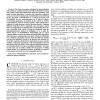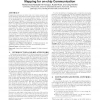1731 search results - page 341 / 347 » Adapting Populations of Agents |
COMPLEXITY
2004
13 years 10 months ago
2004
: Explaining the maintenance of sexual reproduction remains one of the greatest challenges in biology. The theoretical oddity of sex is based on at least three advantages that asex...
IGPL
2010
13 years 9 months ago
2010
Communication between natural or artificial agents relies on the use of a common vocabulary. Since sharing terms does not necessarily imply that the terms have exactly the same m...
MMAS
2011
Springer
13 years 5 months ago
2011
Springer
While existing mathematical descriptions can accurately account for phenomena at microscopic scales (e.g. molecular dynamics), these are often high-dimensional, stochastic and thei...
TSP
2010
13 years 5 months ago
2010
The Lasso is a popular technique for joint estimation and continuous variable selection, especially well-suited for sparse and possibly under-determined linear regression problems....
DAC
2008
ACM
14 years 12 months ago
2008
ACM
Design-time decisions can often only cover certain scenarios and fail in efficiency when hard-to-predict system scenarios occur. This drives the development of run-time adaptive s...


